It’s been about 10 years since I last went on a whale watching cruise – and that time it was the end of October and the last one available of the season – it was damn freezing and we didn’t get to see many whales.
I highly recommend not leaving it so late, and mid-August was much better, both in terms of keeping warm and the number of whales we managed to observe. Note that the season for whale watching runs from May through to October.
There are 80 species of whales, of which 13 can be seen in the Saint Lawrence. The Beluga is the only one that lives in the Saint Lawrence year round, while the other 12 migrate there.
We managed to see three species during the 3 hour cruise; Humpback’s, Minke’s and Beluga’s. The Humpbacks were by far the most impressive of the 3 as they raise their large tail out of the water each time they dive. Some of the pictures below may be Minke’s, but hard to tell when you only see their back. Unfortunately the few shots of Belugas I managed to capture were disappointing, so mainly below are shots of the Humpbacks.
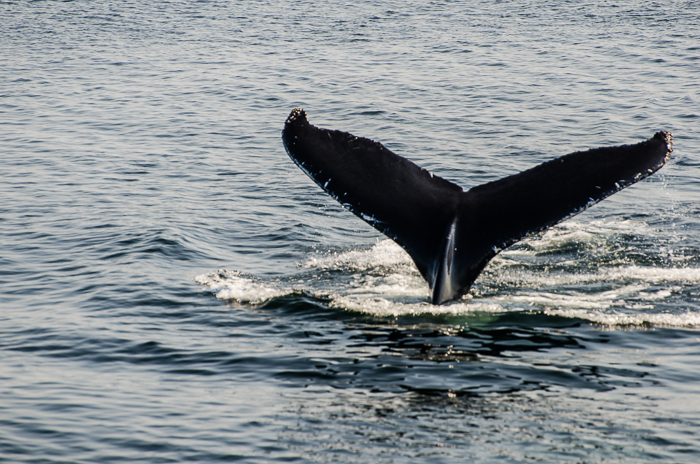
Humpback Whale lifting tail before diving
ISO 200 – 240mm – f5.3 – 1/400 sec
There are numerous companies that offer whale watching excursions out of Tadoussac and are either by Zodiac or larger vessels – we opted to go on one of the larger boats.
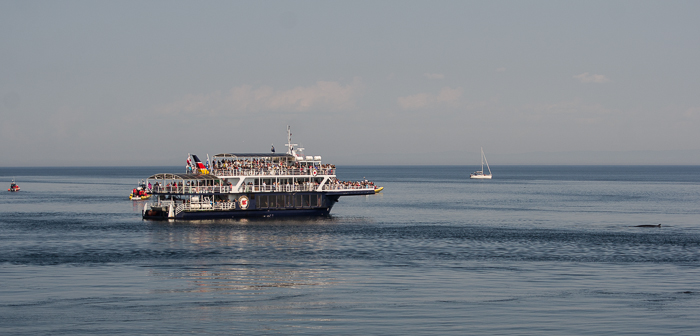
Whale watching with Croisières AML at Tadoussac
ISO 200 – 70mm – f5 – 1/400 sec
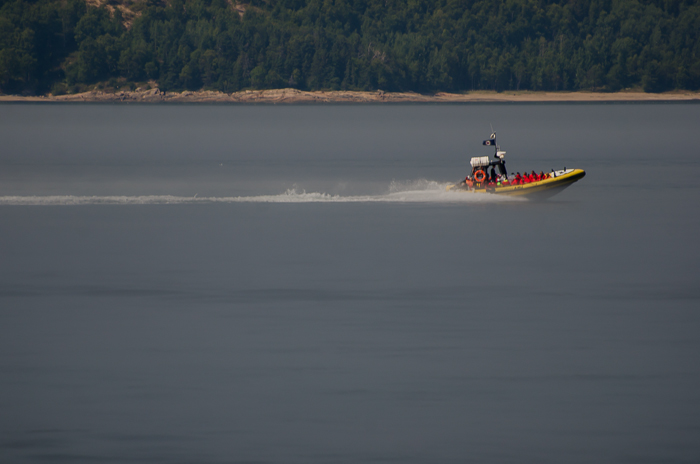
Whale watching by Zodiac at Tadoussac
ISO 100 – 300mm – f5.6 – 1/400 sec
Once we were out in the seaway, the boat headed directly for the spot where whales had been sighted and they were there in pretty large numbers, often a few showing up at the surface at the same time.
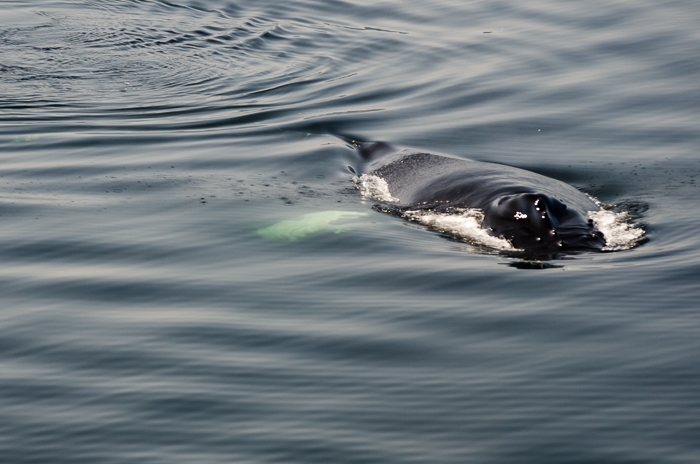
Whale watching on the Saint Lawrence
ISO 200 – 180mm – f5 – 1/320 sec
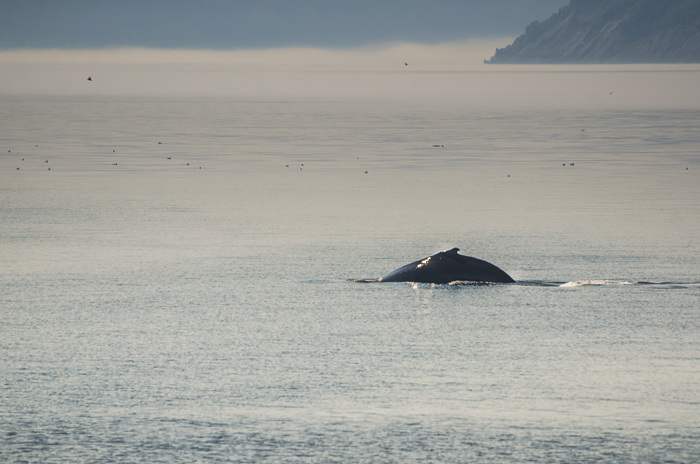
Whale watching at Tadoussac
ISO 200 – 270mm – f5.6 – 1/640 sec
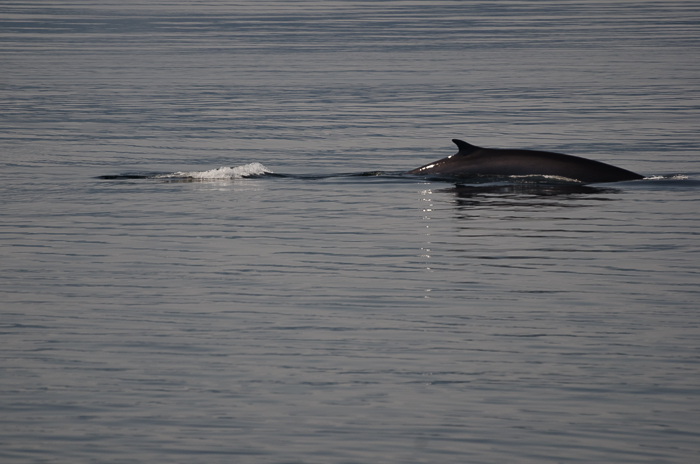
Whale watching at Tadoussac
ISO 200 – 300mm – f5.6 – 1/800 sec
I didn’t take any video footage, so here’s a sequence of shots of one of the Humpbacks lifting his tail before diving.
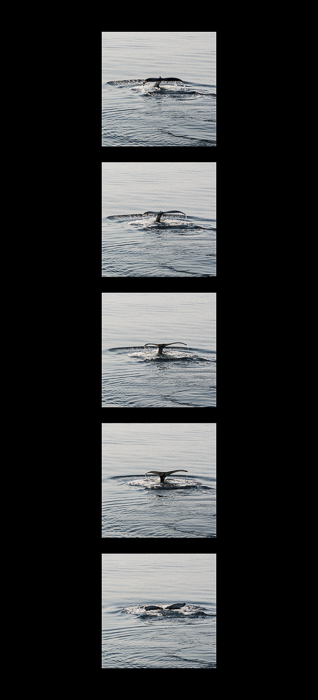
Humpback Whale diving sequence
ISO 200 – 112mm – f5 – 1/320 sec
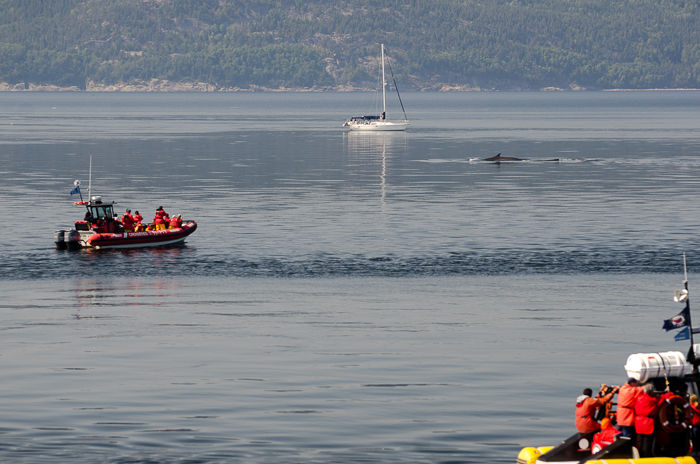
Whale watching on the Saint Lawrence
ISO 200 – 116mm – f5 – 1/400 sec
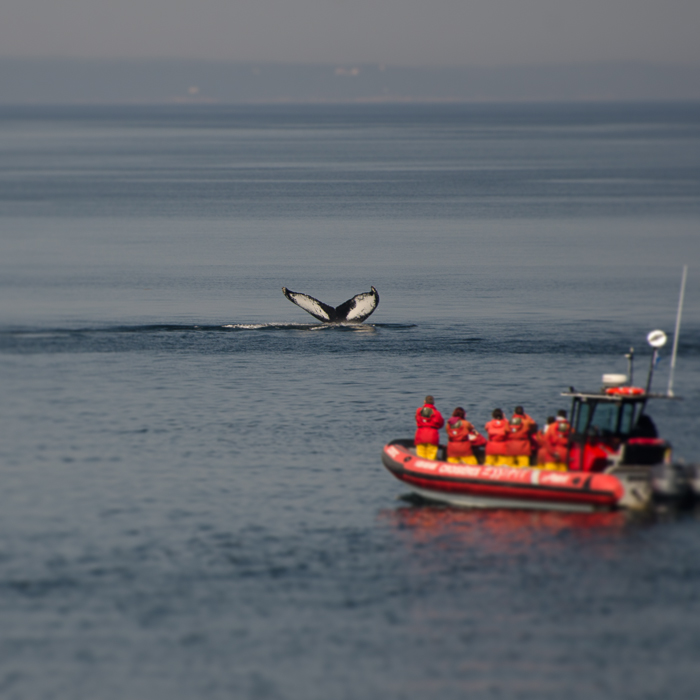
Whale watching on the Saint Lawrence
ISO 200 – 300mm – f5.6 – 1/400 sec
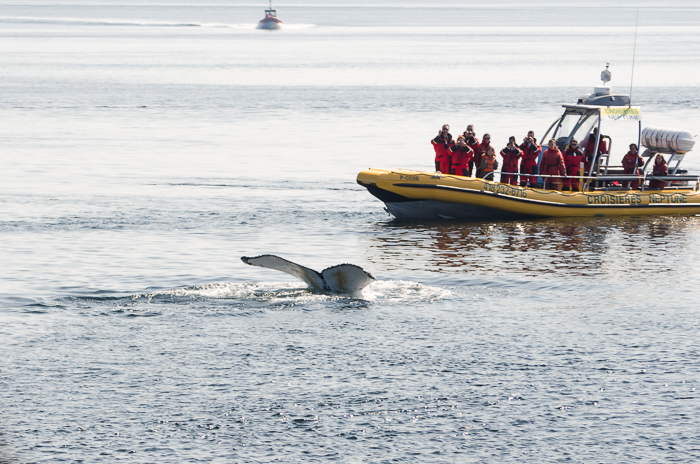
Humpback Whale diving beside a Zodiac
ISO 200 – 110mm – f4.5 – 1/400 sec
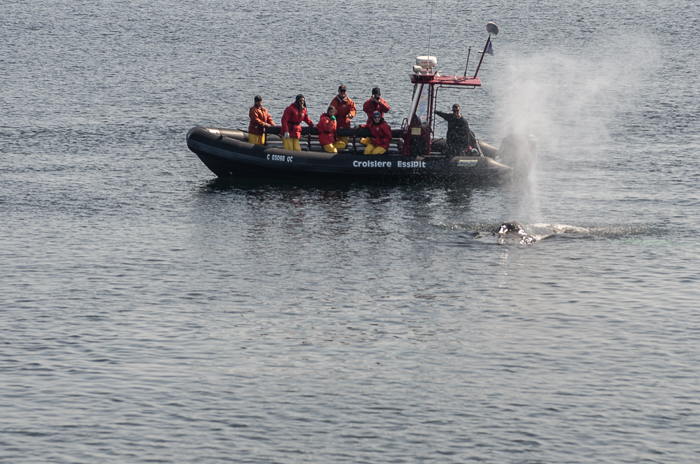
Croisière Essipit Whale watchers up close
ISO 200 – 135mm – f4.8 – 1/400 sec
After spending quite a bit of time observing the whales, the boat headed back to shore, returning via the offshore lighthouse which I managed to get a few shots of.
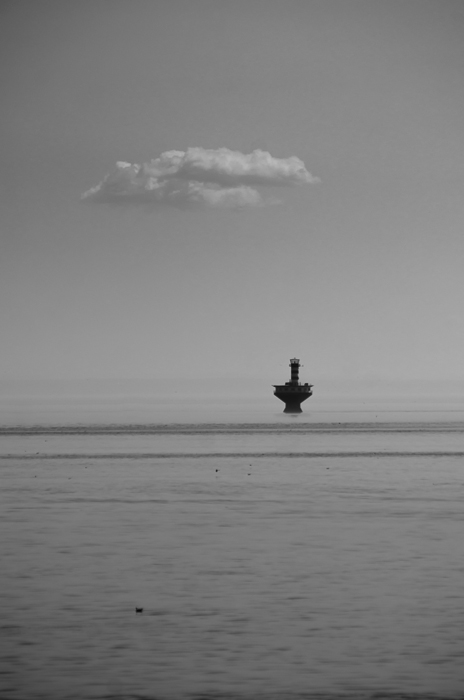
Lighthouse near Tadoussac
ISO 100 – 185mm – f5 – 1/640 sec
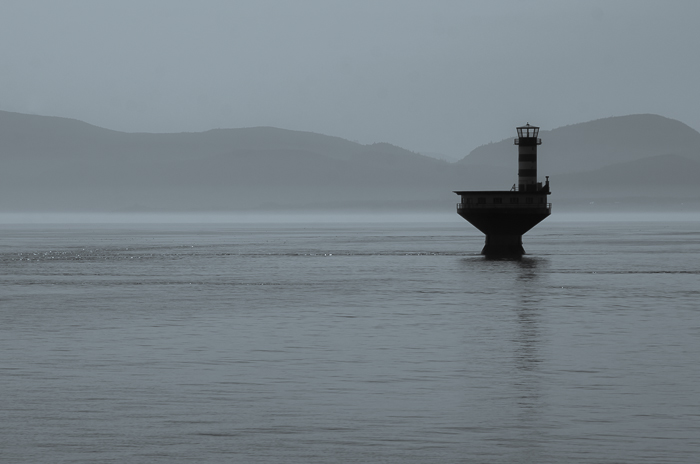
Lighthouse near Tadoussac
ISO 200 – 125mm – f8 – 1/640 sec
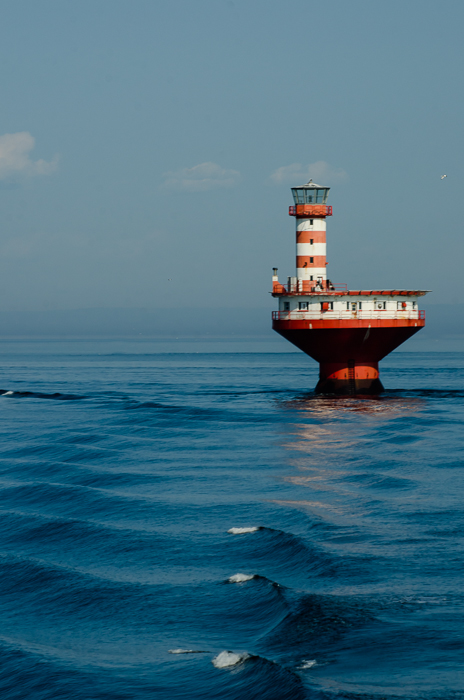
Lighthouse near Tadoussac
ISO 200 – 125mm – f13 – 1/160 sec
As we neared the shore a flock of seagulls flew through the fog which I thought would make a nice black and white minimalist shot.
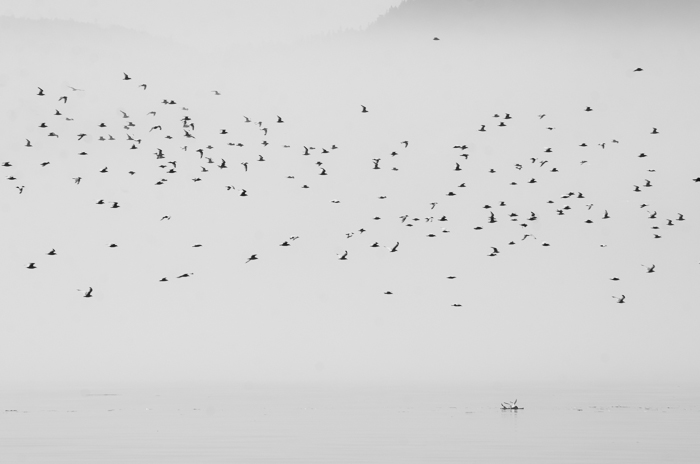
Flock of seagulls
ISO 100 – 300mm – f9 – 1/800 sec
It was a shame we didn’t get to see any Blue Whales, which our guide informed us had been spotted the week earlier :/
The 13 species of whale found in the Saint Lawrence
Here’s a list of the 13 species that can be found in the Saint Lawrence (source: Québec Maritime).
- Harbour porpoise – 1.5 to 2 m, 45 to 50 kg
The smallest of the St. Lawrence cetaceans and one of the smallest in the world, the harbour porpoise is hard to spot. However, there are over 20,000 in the St. Lawrence.
- Atlantic white-sided dolphin – 2 to 2.7 m, 180 to 230 kg
They are found in great numbers in the gulf and occasionally visit the estuary.
- White-beaked dolphin – 2.5 to 3 m, 135 to 275 kg
They also visit the gulf regularly but are generally found further north.
- Beluga whale– 3 to 4.5 m, 0.7 to 1.5 tonnes
Belugas have the widest vocal range among cetaceans. The only whales to live year round in the St. Lawrence.
- Long-finned pilot whale – 4 to 5 m, 2 to 3.5 tonnes
These large dolphins form family units of several dozen individuals. They regularly visit the gulf, but are rarely found in the estuary.
- Killer whale – 6 to 7 m, 3 to 7 tonnes
The killer whale is rarely seen in the St. Lawrence. However, since 1984, a pod of three individuals has been regularly sighted in the gulf, off Mingan.
- Minke whale – 6 to 9 metres, 6 to 8 tonnes
The smallest of the baleen whales, minkes display their pink undersides as they hunt near the shore.
- Northern bottlenose whale – 6 to 10 m, 3 to 7 tonnes
A small population of northern bottlenose whales lives in the waters off Nova Scotia. To date, the only individuals spotted in the St. Lawrence have been live stranded whales.
- North Atlantic right whale – 10 to 15 m, 30 to 60 tonnes
The North Atlantic right whale is the quintessential whale, just as you imagine it: round and chubby! Once heavily hunted, some 300 survivors are left in the North Atlantic.
- Humpback whale – 11 to 13 metres, 25 to 30 tonnes
The best known of the large cetaceans, humpbacks show their tail with every dive.
- Sperm whale – 11 to 15 m, 15 to 40 tonnes
sperm whales have been sighted regularly in the St. Lawrence Estuary since 1991.
- Fin whale – 18 to 21 metres, 40 to 50 tonnes
A few dozen fin whales, the world’s second largest animals, can be spotted in the St. Lawrence Estuary every summer.
- Blue whale – 21 to 26 metres, 80 to 210 tonnes
Only a few hundred blue whales—the largest animals on the planet—still exist. The St. Lawrence is one of the rare places in the world where they can be observed near the shore.
Thanks for stopping by. Until next time.
– Martin
Montréal in Pictures
Your virtual guide in and around Montréal